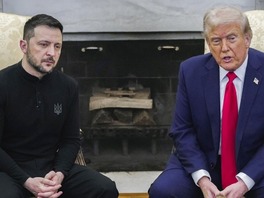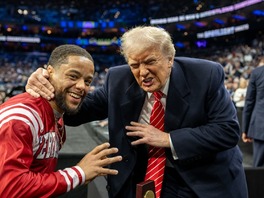The Merkel era in Germany, which has lasted 16 years, is coming to an end. Next Sunday, the country will elect a new parliament, with the new coalition and government being formed as a result. The leader of the electoral race has changed several times over the past few months, maintaining the intrigue up until Election Day. This, in turn, has opened the space for numerous speculations and predictions about the composition of the future coalition. Mykola Kapitonenko, a foreign policy expert of the International Centre for Policy Studies, explained what Ukraine can expect from German elections.
Two weeks before the election, the rating of the Social Democratic Party of Germany rose to 26%. Led by perhaps Germany's most popular politician today, Olaf Scholz, the party is heading toward victory in the election. CDU / CSU is still expected to receive 20%. The Greens follow with 15% and the Free Democratic Party with 13%. The Alternative for Germany and the Left Party trail with 11% and 6% respectively.
These figures indicate that the composition of the Bundestag will prove quite diverse. Gone are the days of the classic "two-and-a-half-party" system in Germany, with the CDU / CSU and SPD competing for power and forming coalitions with the Liberals. Several new parties are now significantly present in the country's political landscape at the federal level. Hence, a new coalition may need at least three parties.
With this, it is no longer enough to win the election. One needs to be able to negotiate, compromise and make agreements with other political players. When six or more parties gather at the table, agreeing will not be easy. What we definitely should not expect is the Ukrainian single-party majority.
At the same time, the contours of the new coalition are currently unclear. However, it is quite difficult to imagine the coalition without the SPD. The same cannot be said about the CDU / CSU, with its positions looking less convincing without Merkel. Given that the Greens' election campaign was based on criticism of the Merkel government, it is harder to imagine them in a coalition with the CDU / CSU rather than with the Social Democrats.
The Free Democratic Party, like the Greens, may become the golden shareholder. As part of the "black and yellow" coalition (with the CDU / CSU), they were in the government in 2009-2013. Then, they didn’t get into parliament and found themselves in the opposition. The alliance with the CDU / CSU looks most natural for the party now, including due to an akin experience at the regional level.
Forming alliances will be more difficult for smaller parties, although the very fact of overcoming the electoral barrier will prove a victory for them. Hypothetically, the Left Party could enter into a coalition with the SPD and the Greens, but this scenario is unlikely. It will be even harder for the Alternative for Germany to find coalition partners: the radical right-wing party does not have the best reputation in Germany.
Negotiations will begin immediately after the election and may last quite a while. For instance, almost 8 months have passed between the 2017 election and the formation of the government.
The Merkel factor will play an interesting role as well. The Chancellor has dominated the political life of Germany and Europe for too long. Her departure will leave Germany with a sense of devastation, similar to when other great chancellors – such as Helmut Kohl – left politics.
Along with the new spectrum of political parties, the challenges before the country have changed. They have become more diverse, less predictable, and less traditional. In recent years, the conflict in eastern Ukraine, the "refugee crisis" and, of course, the coronavirus pandemic have been severe challenges for the Merkel government. The results of its policies in each of these areas were controversial and often criticized from various angles. The new chancellor will have to deal with some of them.
Berlin has recently been looking for compromises and red lines in its foreign policy. Germany's economy is export-oriented, large, and dynamic. Against this background, foreign policy is quite pragmatic and aimed at finding markets and sources of raw materials. At the same time, the desire to play a leading role in the EU and spread European values adds to the idealism – sometimes, a balance is difficult to find. While not perfectly, Merkel managed to do so. Will the new Chancellor succeed?
The most interesting topic for Ukrainians, the foreign policy of the new German government is unlikely to be as important for most Germans. The issue of foreign policy is quite conservative, and drastic changes are extremely unlikely. However, the situation is not easy for Berlin. The EU crisis continues; relations with the United States have not been fully restored; the Russian challenges and opportunities remain on the agenda, and there is no joint European policy towards China.
It will not be easy to abandon anti-Russian sanctions, but it will also prove difficult to turn participation in the Normandy format into a success story. Against this background, many in Ukraine will expect Berlin-Moscow cooperation at the expense of Ukrainian interests.
Given how the intertwining of interests concerning Nord Stream-2 was misinterpreted in Ukraine and how long Ukraine failed to understand that the project is primarily German, we will have a difficult time building something constructive with the new Chancellor's office. However, the so-called betrayal is more likely to stem from our incompetence than from any Germany-Russia conspiracy.






